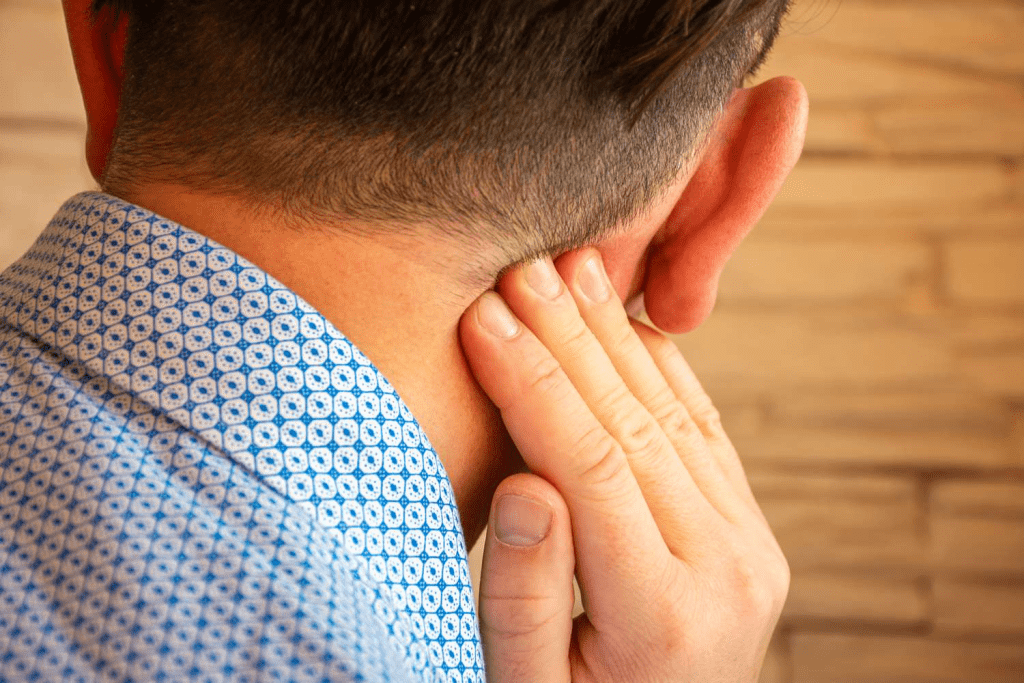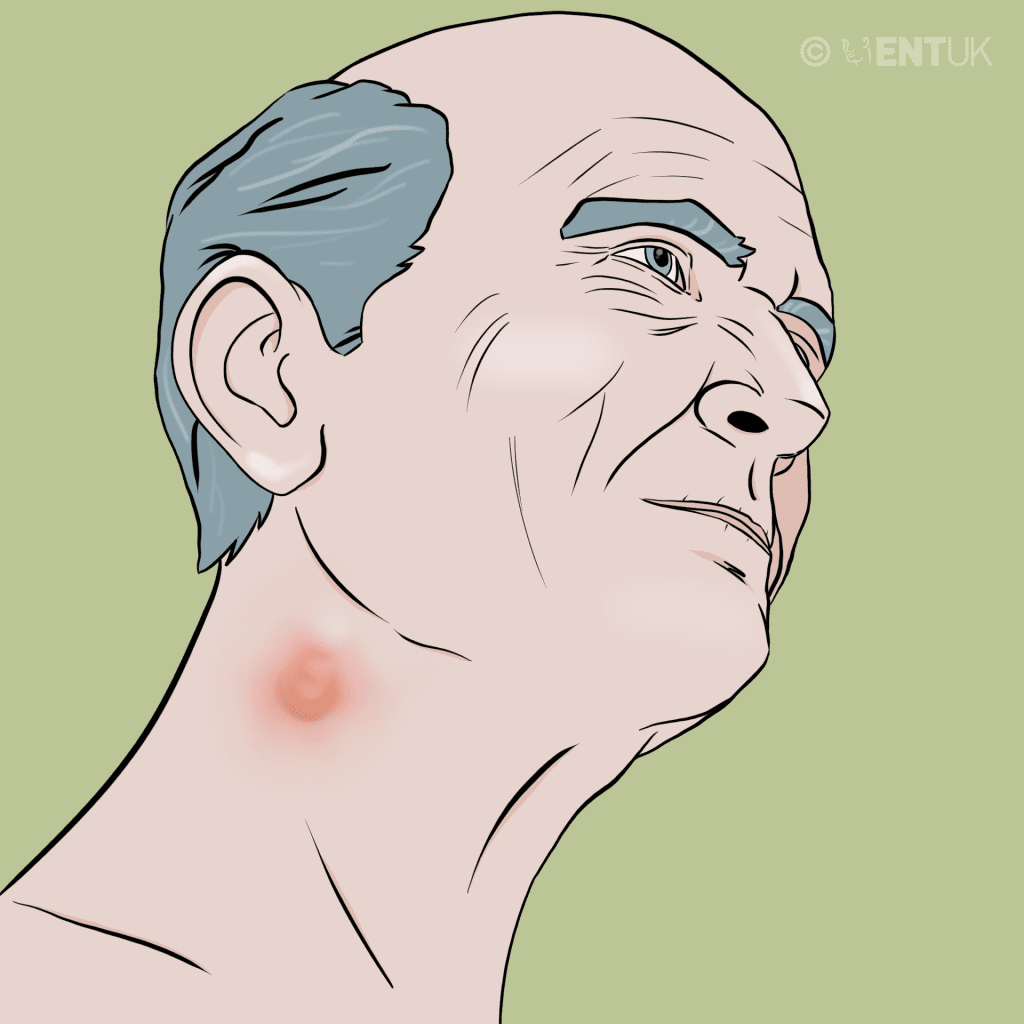Finding a lump or swollen lymph node on your neck, back, or near your ear can be alarming. It’s natural to worry, but most of the time, these lumps are harmless and temporary. Swollen lymph nodes often indicate that your immune system is working to fight an infection. However, in some cases, persistent or unusual swelling could signal a more serious underlying condition.
So, how do you know when to relax and when to see a doctor? This guide will help you understand the causes of swollen lymph nodes, recognize warning signs, and explore treatment options.

What Are Lymph Nodes and Why Do They Swell?
Lymph nodes are small, bean-shaped glands that play a critical role in your immune system. They filter out harmful substances like bacteria, viruses, and toxins while producing white blood cells to fight infections.
You have hundreds of lymph nodes throughout your body, but they are most noticeable in areas such as:
✅ Neck – Under the jaw or behind the ears
✅ Armpits – Where the arms meet the torso
✅ Groin – Near the hip joints
✅ Spine & back – Less common but possible
When your body fights off an infection, lymph nodes can swell, become tender, or feel firm. This reaction is a normal immune response. But sometimes, persistent swelling may indicate a more serious issue.
Common Causes of Swollen Lymph Nodes
Most swollen lymph nodes are caused by infections or inflammation. Below are the most common triggers:
1. Viral and Bacterial Infections
Infections are the leading cause of swollen lymph nodes. Some of the most common include:
- Colds and Flu – Viral infections like the common cold or influenza can cause swollen nodes in the neck and throat.
- Strep Throat – A bacterial infection that often leads to painful swelling in the neck.
- Sinus Infections – Blocked sinuses can cause pressure and swelling in nearby lymph nodes.
- Ear Infections – Bacterial or viral infections in the ear can lead to swelling near the jawline, behind the ear, or in the neck.
2. Skin Infections or Injuries
If you’ve recently injured yourself, developed an abscess, or experienced a skin infection, nearby lymph nodes may swell as part of the healing process. Common causes include:
- Infected cuts or wounds
- Scalp infections or fungal infections
- Acne or cystic breakouts near the affected area

3. Autoimmune Disorders
In some cases, autoimmune diseases can cause chronic lymph node swelling. These conditions include:
- Lupus – A condition where the immune system attacks its own tissues.
- Rheumatoid Arthritis (RA) – Causes persistent inflammation, which can lead to swollen nodes.
4. Allergic Reactions
Your lymph nodes may swell in response to allergens, including:
- Pollen, pet dander, or dust
- Certain medications
- Insect bites or stings
If your swollen nodes coincide with an allergic reaction, taking an antihistamine and avoiding the allergen may help reduce the swelling.

5. Cancer (Rare but Serious)
Although rare, swollen lymph nodes can sometimes indicate lymphoma (a type of blood cancer) or metastatic cancer that has spread to the lymphatic system. Signs that warrant immediate medical attention include:
🚨 Hard, immovable lumps
🚨 Swelling lasting longer than 3-4 weeks
🚨 Unexplained weight loss, night sweats, or fatigue
If you notice any of these symptoms, it’s important to see a doctor for further evaluation.
When Should You Be Concerned About a Lump?
Most swollen lymph nodes go away on their own after the underlying infection resolves. However, you should see a doctor if:
❌ The lump lasts longer than 2-3 weeks without improvement.
❌ It is hard, does not move, or keeps growing.
❌ You experience fever, night sweats, or weight loss.
❌ The lump is very painful or red.
❌ You have a history of cancer or other serious conditions.
These could be signs of a more serious underlying condition, requiring medical evaluation and possible testing.

How to Treat and Manage Swollen Lymph Nodes
If your swollen lymph nodes are caused by a mild infection, you can try simple home remedies to relieve discomfort and speed up recovery.
1. Home Remedies for Mild Cases
🏠 Apply a warm compress – Use a warm washcloth on the swollen area for 10-15 minutes, a few times a day.
💊 Take over-the-counter pain relievers – Medications like ibuprofen or acetaminophen can reduce swelling and discomfort.
💧 Stay hydrated – Drinking plenty of fluids helps your body fight off infections faster.
😴 Rest – Giving your body time to recover is key to reducing inflammation and swelling.
2. When to Take Medication
If your doctor diagnoses a bacterial infection, you may need antibiotics. In contrast, if a viral infection is the cause, the best treatment is rest, hydration, and symptom relief.
3. Managing Chronic Swollen Nodes
If your swollen lymph nodes are due to autoimmune conditions like lupus or rheumatoid arthritis, your doctor may prescribe anti-inflammatory medications or immune-modulating treatments to help control flare-ups.
4. Seeking Medical Testing for Persistent Lumps
If your lymph nodes remain swollen for an extended period, your doctor may recommend tests such as:
- Blood work to check for infections or autoimmune diseases.
- Ultrasound or CT scan to evaluate the size and structure of the lump.
- Biopsy in rare cases where cancer is suspected.

How to Prevent Swollen Lymph Nodes in the Future
While not all causes of swollen lymph nodes are preventable, you can reduce your risk by:
✅ Maintaining good hygiene – Washing hands regularly to prevent infections.
✅ Strengthening your immune system – Eating a balanced diet, getting enough sleep, and exercising.
✅ Avoiding close contact with sick individuals – Especially during cold and flu season.
✅ Keeping allergies under control – Using antihistamines and avoiding triggers.
If you frequently experience swollen lymph nodes, it may be worth discussing immune-boosting strategies with your doctor.
Conclusion – When in Doubt, Listen to Your Body
Finding a lump or swollen node on your neck, back, or near your ear can be unsettling, but in most cases, it’s not a cause for alarm. Your body’s lymphatic system is designed to react to infections, injuries, and irritants, and swelling is often just a sign that it’s doing its job.
However, if the swelling persists, grows, or is accompanied by concerning symptoms, it’s always best to seek medical advice. Early detection and proper care can ensure peace of mind and optimal health.
So, the next time you feel a lump, take a deep breath—and trust your body to guide you in the right direction.